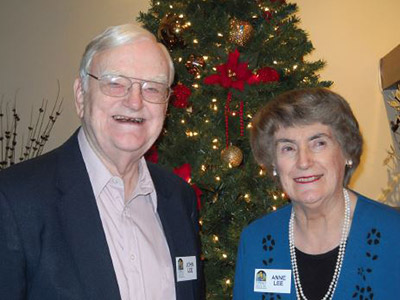Featured stories about SPH people, research and impact.
Read new stories on the SPH Blog
Featured stories about SPH people, research and impact.
Read new stories on the SPH Blog

Not long before he died in late August, John A. H. Lee, professor emeritus of epidemiology, and his wife, Anne, established an endowed fellowship in honor of his family’s passions for higher education, teaching and scientific research around public health.
Select graduate students in the UW School of Public Health will be able to travel around the world to engage communities in health promotion, thanks to a new fellowship established by former U.S. Rep. Jim McDermott, the long-time Seattle Congressman.
Tenacious learner, engaged community leader, loving mother. These words describe this year’s Double Eagle II Endowed Scholar, Farhiyo Ahmed, a senior in the Public Health Major.
Originally from Kenya, Ahmed is the first person in her family to go to college. She grew up in the world’s largest refugee camp, called Dadaab, where her family depended on humanitarian aid agencies for food, water, healthcare and education. “They were doing their best job to improve the quality of life for some of the world’s most vulnerable people,” Ahmed says.
When the leads dried up in the rape and murder of a young woman in Idaho Falls, police turned to Ancestry.com, hoping to find someone related to the killer. Their search led them to a New Orleans filmmaker, whose father’s DNA had appeared on the popular website.
The initial genetic match was strong, and the filmmaker was under suspicion for a month before additional DNA testing exonerated him. It is the first known case where police conducted a forensic familial search using a commercial DNA database — and it raised all kinds of ethical questions.
Raising the minimum wage in Seattle to $13 an hour did not affect the price of food at supermarkets, according to a new study led by the University of Washington School of Public Health.
Elizabeth “Betty” Bekemeier, director of the Northwest Center for Public Health Practice (NWCPHP) at the University of Washington School of Public Health, has received a five-year, $2 million grant to help rural public health leaders better use data to promote health equity.
Calls to 9-1-1 for serious emergency medical assistance increase significantly on days of extreme heat, especially in poor, elderly and urban populations, according to a new study from the University of Washington School of Public Health.
Death, dismemberment, damage, disruption and distress. These are dangers people face during and immediately after storms like Harvey and Irma. But what about the hidden hazards of hurricanes? Experts from the University of Washington School of Public Health weigh in.

Diarrheal diseases
We know that connecting with nature is good for our health, thanks to a growing body of evidence. But how do we measure a “dose” of nature? Do we get the same benefits from having plants in our offices that we do from gardening in our yards? Is looking at a picture of the ocean the same as seeing it in person?
Scientists say a research effort focused on questions like these has the potential to yield public health insights.
Nicole Errett, from the University of Washington School of Public Health, received a 12-month, $50,000 grant from the Robert Wood Johnson Foundation (RWJF) to study how state policies for disaster recovery planning promote health and well-being.
Errett, a lecturer in the Department of Environmental and Occupational Health Sciences, is among a select group of early career researchers chosen to receive a grant from New Connections, a national program that introduces new scholars to RWJF and expands the diversity of perspectives informing the Foundation’s programming.
In Washington state, 300,000 children experience food insecurity and 61 percent of adults are obese or overweight. All the while, farmland is decreasing, farmers struggle to earn a living wage, and food system practices generate pollution.
Joel Kaufman and Howard Frumkin from the University of Washington School of Public Health were elected in August to the Washington State Academy of Sciences for their outstanding record of scientific achievement. They are among 13 new members, including six from the University of Washington, who were inducted Sept. 14 in Seattle.
Noel Weiss, professor of epidemiology at the University of Washington School of Public Health, was honored by the American Public Health Association Nov. 6 for his lifelong excellence in teaching epidemiology.
Men measuring 5 feet 9 inches and taller are more likely to be diagnosed with a more aggressive form of prostate cancer, according to researchers.
UW researchers evaluate the use of text messaging and other tools during emergencies
In the aftermath of the catastrophic 2010 earthquake in Haiti, a texting platform helped to save lives and coordinate emergency response. As existing emergency systems failed, text messages were still getting through.
Drug deaths hit a record high of 332 in King County, in Washington state, in 2016, according to an annual report published by the University of Washington’s Alcohol and Drug Abuse Institute (ADAI). Two-thirds of those deaths were caused by heroin, fentanyl and other opioids.
Patients who are prescribed both opioids and sedating drugs are six times more likely to die of an overdose than people on opioids alone, according to researchers from the University of Washington School of Public Health and the Washington State Department of Labor and Industries.
The UW Superfund Research Program received a five-year, $10 million award from the NIH to continue studying the effects that environmental pollutants pose to the nervous systems of humans and fish.
Young people with chronic or severe depression are at elevated risk for developing a problem with cannabis in later adolescence, according to a new study from the University of Washington.
The study, led by Isaac Rhew, adjunct research assistant professor at the UW School of Public Health, interviewed 521 students from four Seattle public middle schools. Researchers used data from annual assessments of the students at ages 12 to 15 and then again at 18.